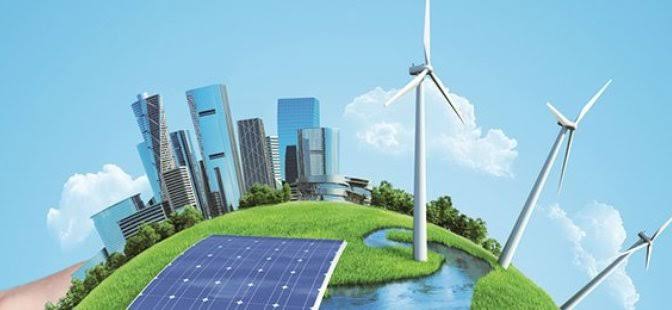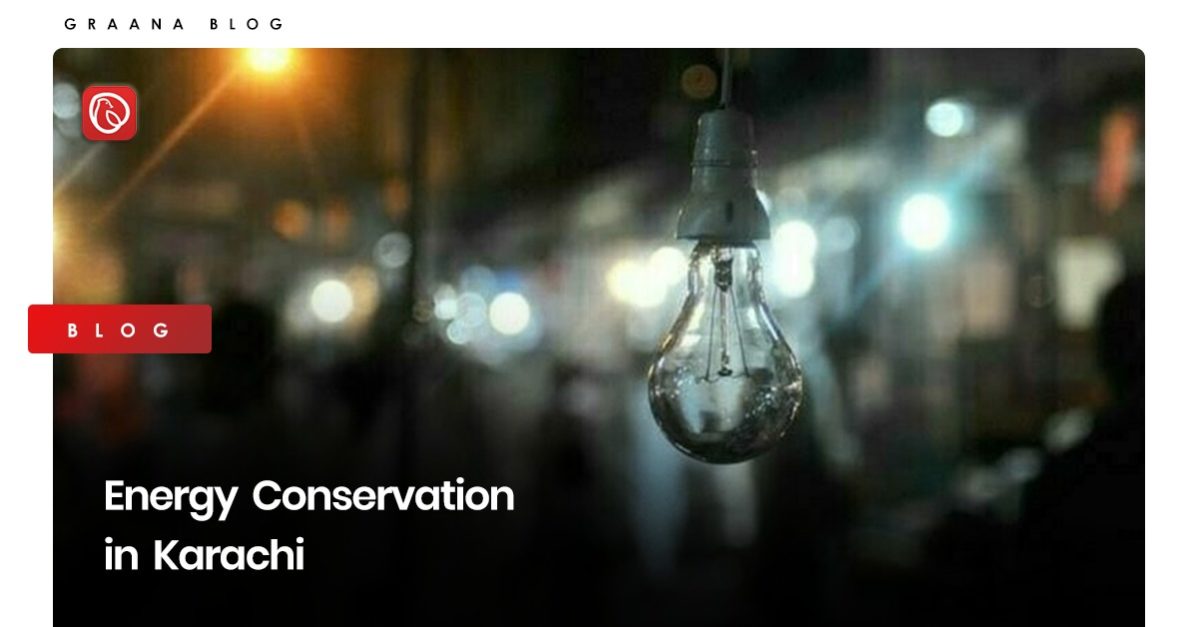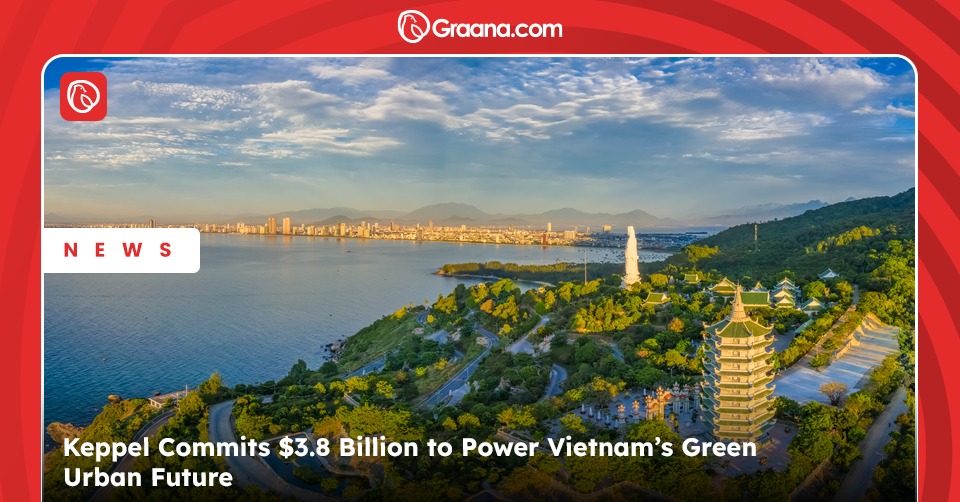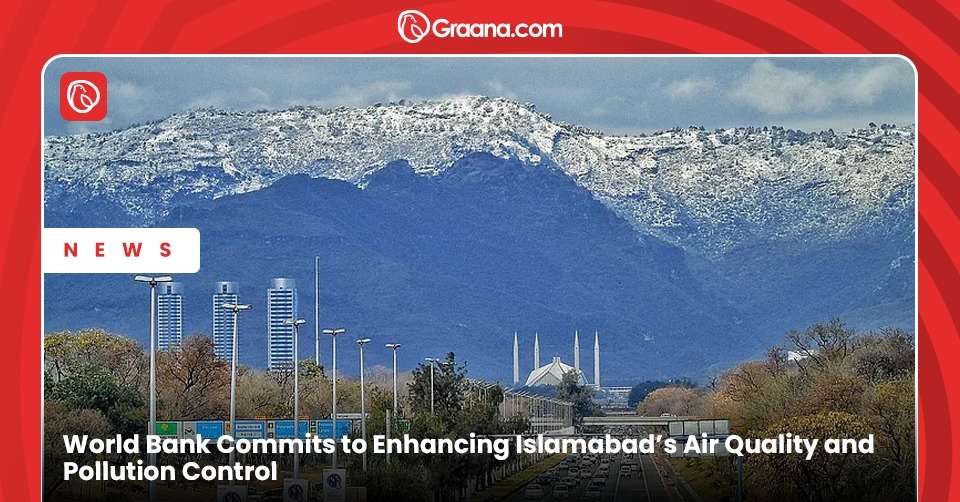Karachi is a rapidly growing city; in the past, the population was just a few hundred thousand, but it has now increased to over 30 million people. Unfortunately, much of the city’s development is unplanned, leading to the emergence of settlements without basic infrastructure, such as schools, hospitals, and access to water and electricity.
Private organisations have stepped in to address these issues, providing medical facilities, emergency services, and educational opportunities. However, with a growing population and increasing industrialisation, the city is facing another major challenge: energy conservation.
Graana.com discusses the importance of energy conservation in Karachi below, along with the causes and impact of high energy conservation, the challenges faced, and the steps that are taken to reduce energy consumption in the city.
What Is Energy Conservation?

Energy conservation refers to the practice of reducing the use of energy in order to conserve resources, lower emissions, and reduce costs. Any city can achieve this through a variety of means, such as increasing energy efficiency, using renewable energy sources, and reducing demand through lifestyle changes.
It can also involve the use of technology to improve the energy efficiency of buildings, vehicles, and industrial processes. The goal of energy conservation is to reduce the amount of energy needed to maintain a certain level of economic activity, while also reducing the environmental impact of energy production and use.
Importance of Energy Conservation in Cities

Energy conservation is particularly important for cities, as they are major consumers and are responsible for a significant portion of global greenhouse gas emissions. By conserving energy, cities can reduce their environmental impact, lower energy costs, and improve the quality of life for their residents.
One of the most important ways that cities can conserve energy is by increasing the energy efficiency of buildings. This can include retrofitting existing buildings with energy-efficient technologies, such as insulation, energy-efficient lighting and heating systems, and smart controls. Cities can also encourage the construction of new, sustainable buildings.
Another important aspect of energy conservation is the use of renewable energy sources. This can include solar, wind, and geothermal energy, as well as biofuels and other forms of sustainable energy. By increasing the use of renewable energy, cities can reduce their dependence on fossil fuels and lower their greenhouse gas emissions.
Cities can also encourage energy conservation through public education and outreach programs, as well as through policies and regulations that promote energy efficiency and the use of renewable energy.
For example, they can provide incentives for businesses and residents to install solar panels or switch to electric vehicles. They can also adopt building codes that require new construction to meet certain energy efficiency standards.
Overall, energy conservation is a key strategy for cities to reduce their environmental impact and improve the quality of life for their residents, while reducing costs and promoting economic growth.
By implementing energy conservation measures, Karachi has the potential to reduce, if not eliminate, the negative impact on the environment and decrease energy costs for the residents.
Energy Consumption in Karachi
The city’s energy consumption is primarily supplied by the national power grid, which is dominated by thermal power generation (mainly natural gas and oil) and a small amount of hydroelectric power.
Due to the lack of diversified energy sources and insufficient power generation capacity, power outages and load shedding are common in Karachi.
The city also faces a significant gap between supply and demand, resulting in high levels of energy consumption per capita. Additionally, the rapid urbanisation and industrialisation of Karachi have led to an increase in energy consumption in recent years.
Causes of High Energy Consumption in Karachi
There are several factors that contribute to the high energy consumption in Karachi.
Population Growth
As the population of Karachi continues to grow, so does the demand for energy. The city’s population has been increasing rapidly in recent years, putting a strain on the existing energy infrastructure and leading to higher energy consumption.
Urbanisation
The demand for energy increases with the further development of infrastructure. The increased use of air conditioning and other energy-intensive appliances also contributes to higher energy consumption.
Lack of Regulations
Inadequate regulations can lead to higher energy consumption. For example, buildings may not be constructed to meet energy efficiency standards.
Lack of Diversified Energy Sources
The energy mix in Pakistan relies heavily on thermal power generation, mainly natural gas and oil, which is more expensive and not as efficient as other sources of energy such as hydroelectric power.
Inefficient Energy Distribution
Inefficient distribution of energy through the national grid, power theft, and technical losses also contribute to high energy consumption.
Inadequate Power Generation Capacity
Pakistan’s power generation capacity is insufficient to meet the growing demand for energy. This results in power shortages and load shedding, which can lead to higher energy consumption as people rely on backup generators.
Impact of High Energy Consumption

High energy consumption in Karachi can lead to power outages and blackouts due to a strain on the power grid. This can cause inconvenience and disruptions to daily life, as well as business operations.
Additionally, high energy consumption can lead to environmental degradation, as power plants may use fossil fuels to generate electricity, which can contribute to air and water pollution. This can have negative impacts on public health and the natural environment.
Energy Conservation Efforts in Karachi
The government has taken multiple initiatives to conserve energy in Karachi. This includes the development of renewable energy projects, such as solar and wind power. It has also implemented policies to promote energy-efficient buildings and appliances.
The private sector in Karachi has also taken steps to conserve energy, such as conducting energy audits to identify areas where energy can be saved and implementing green building certifications to promote environmentally-friendly construction practices.
Thirdly, there have also been community-based initiatives in Karachi, including energy conservation education programs and public awareness campaigns. These may include events, workshops, and campaigns on energy conservation. This might also involve partnerships with local organisations and community groups to promote energy-efficient practices.
Overall, it’s important to note that energy conservation efforts in Karachi require the participation of all stakeholders. This includes the government, private sector, and communities to be effective. This can lead to a sustainable, resilient, and reliable energy supply for the city, and help mitigate the negative impacts of high energy consumption.
Energy Conservation Measures
There are several steps that government should take to reduce energy consumption and promote sustainable development in Karachi.
Implement Energy-Efficient Building Codes and Regulations
One of the most effective ways to reduce energy consumption in Karachi is to implement building codes and regulations that promote energy efficiency.
This can include codes for insulation, lighting, and HVAC systems, as well as requirements for energy-efficient appliances and equipment. By ensuring that new buildings are built to be energy-efficient, the city can cater to the high demand.
Encourage the Use of Renewable Energy Sources
Another important step in reducing energy consumption in Karachi is to promote the use of renewable energy sources. Solar and wind power are two of the most promising options for the city. This is because they can be generated locally and do not produce greenhouse gases.
The government should encourage the use of these sources by providing financial incentives to individuals and businesses that install solar panels or wind turbines.
Promote Energy-Efficient Appliances and Equipment
The use of energy-efficient appliances and equipment should be promoted, which can include Energy Star-rated appliances.
Incentives can also be provided to all parties who upgrade to more energy-efficient equipment. By reducing the energy consumption of appliances, Karachi can help conserve the energy demand.
Encourage the Use of Public Transportation, Biking, and Walking
In order to reduce dependence on fossil fuels, it is important to promote the use of public transportation, biking, and walking in Karachi.
This can be achieved by building more bike lanes and pedestrian walkways, as well as investing in public transportation infrastructure. Additionally, the city could also provide incentives to those who switch to electric vehicles, which would help reduce air pollution and dependence on fossil fuels.
Implement Smart Grid Technology
Smart grid technology can also play an important role in reducing energy consumption in Karachi. By using advanced sensors and automation systems, the city can improve energy efficiency and reduce waste.
Additionally, smart grid technology can also help improve the reliability of the electricity supply and reduce the need for expensive new power generators.
Challenges to Energy Conservation in Karachi
There are three prevalent issues related to energy conservation in Karachi:
- Lack of political will
- Limited funding
- Resistance to change
Lack of Political Will

One significant challenge to energy conservation in Karachi is the government’s lack of commitment to addressing energy conservation and investing in sustainable energy solutions, which can make it difficult for individuals and organisations to take action.
Additionally, there may be a lack of effective policies and regulations in place to promote energy conservation. Moreover, the lack of enforcement of existing regulations adds to this. Furthermore, there may be issues with corruption, where officials are more interested in their own financial gain than in addressing the energy crisis.
The lack of political will can also lead to the neglect of renewable energy sources such as solar, wind, and hydropower, which can provide a more sustainable and long-term solution to the city’s energy needs.
It is important for the government and political leaders in Karachi to take a more proactive approach to address the energy crisis, by creating and enforcing policies that encourage energy conservation and investing in sustainable energy solutions.
This will not only help conserve energy but also improve the overall quality of life for the people living in Karachi.
Limited Funding
Many energy conservation projects and initiatives require significant financial resources, and the lack of funding can make it difficult for these projects to get off the ground.
For example, investing in energy-efficient technologies, such as LED lighting and solar panels, can be expensive and may not be financially feasible for many residents, businesses, and organisations in Karachi. Additionally, upgrading infrastructure, such as power plants and transmission lines, requires a large amount of funding which may not be available.
Furthermore, limited funding can also affect research and development of new energy-efficient technologies, which can greatly contribute to energy conservation.
To overcome this challenge, the government, private sector, and international organisations should invest in energy conservation projects and initiatives in Karachi. This can include providing financial incentives for businesses and organisations to invest in energy-efficient technologies. They should also fund research and development of new sustainable energy solutions.
Additionally, partnerships between the government, private sector, and international organisations can also be established. The aim should be to create a funding mechanism for energy conservation projects in Karachi.
Resistance to Change
Resistance to change is a common challenge in implementing energy conservation measures. This is because people may be hesitant to adjust their behaviours or routines in order to save energy.
This can be particularly true in Karachi, where there may be cultural or economic factors that make it difficult for individuals and businesses to adopt energy-saving practices.
However, there are strategies that the government can use overcome this. This includes education and awareness campaigns and financial incentives to encourage energy-saving behaviours.
Additionally, involving stakeholders in the planning and implementation process can help build buy-in and support for energy conservation efforts.
For more relevant information, visit Graana Blog.




